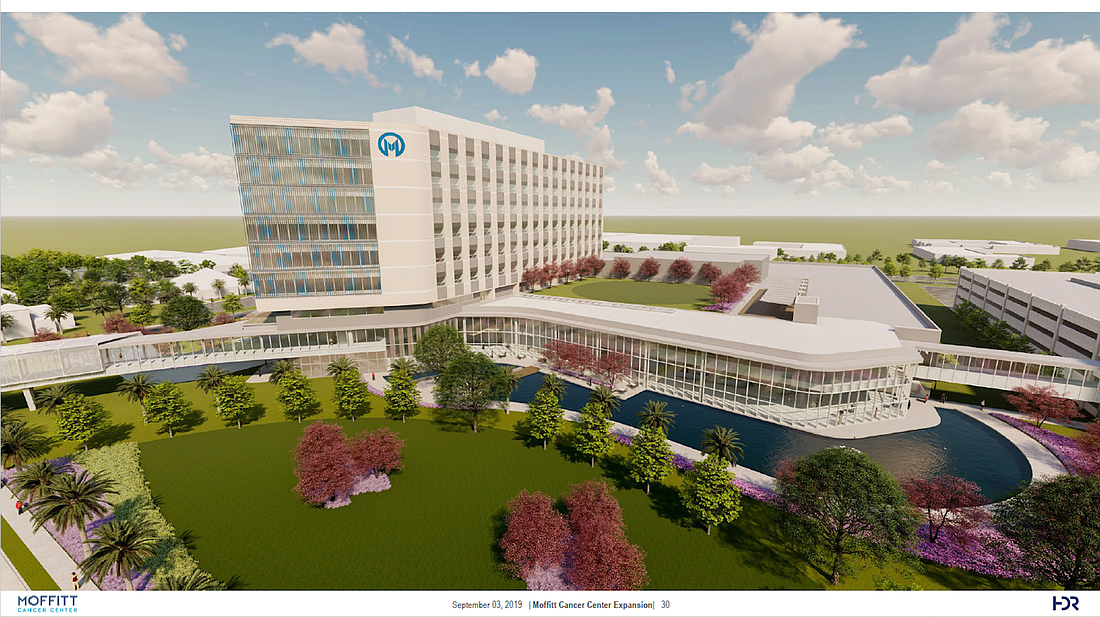- April 15, 2025
-
-
Loading

Loading

Moffitt Cancer Center, as part of a multiyear master plan, is moving ahead with a $300 million-plus hospital near its existing healthcare centers on and around the University of South Florida campus, in Tampa.
Construction of the new 192-bed, inpatient hospital, which also will contain 19 operating rooms, is slated for completion in 2023, Moffitt officials say.
The planned development at 10901 N. McKinley Drive comes three years after Moffitt acquired the former industrial property. Demolition of the 318,171-square-foot manufacturing building that had occupied the property for 30 years began earlier this month.
The 22-acre tract is directly across the street from an existing Moffitt outpatient center, and the cancer care provider intends to develop a bridge between the two facilities, together with additional parking and a central energy plant.
Moffitt held an official groundbreaking ceremony for the new hospital, which will double the total number of operating rooms at Moffitt, on June 16.
“Many patients that we see come to us with unique forms of cancer that require specialized treatments,” says Jack Kolosky, Moffitt’s COO. “Our volume of patients continues to grow, and we’re maxing out our inpatient beds and surgical capacity.”
Moffitt’s expansion comes as many hospitals and healthcare providers are shifting their business models to more outpatient care and seeking ways to reduce the total patient time inside facilities. Kolosky says that while outpatient care has become a greater focus for Moffitt in recent years, the specialized nature of cancer treatment often requires that patients be admitted or that they stay in the hospital for lengthy periods.
Moffitt, too, has been boosting its outpatient facilities in response to macro-economic trends. Its last major expansion, the Richard M. Schulze Family Foundation Outpatient Center at its McKinley campus, was completed in 2015.
But the new 500,000-square-foot hospital will provide an economic development boost to the Tampa Bay region at a time when many construction projects have either slowed or been postponed because of the COVID-19 pandemic.
“The scale of this project and what it will bring to the Tampa Bay area will be immense,” says Fred Hames, an executive vice president with Barr & Barr, Moffitt’s general contractor on the new hospital. “It’ll be the biggest capital project they’ve done in a long, long time – maybe tripling the scale of what they did across McKinley five years ago.”
Hames adds the new hospital also will create hundreds of new construction-related jobs. As many as 550 workers will be building the project on a daily basis.
“Moffitt is going to be investing a significant amount of money into this over the next three years, both in the form of the capital project and the equipment they’ll need inside it,” Hames says. “It’s really going to energize the market.”
Moffitt’s new hospital is being designed by HDR and Hammes Cos., of Milwaukee, will work as Moffitt’s owner’s representative on the project.
Kolosky says the new hospital will be financed through a mixture of hospital revenue bonds, fundraising and cigarette tax bonds approved earlier this year by the Florida Legislature.
At the same time, Moffitt’s status internationally as a premier cancer treatment facility – the hospital has treated patients from 130 countries around the world – and projected increases in cancer are dictating growth, officials say.
Amanda Sangster, a Moffitt spokeswoman, says cases of cancer in Florida alone are expected to double over the next decade.
That expected trajectory in patients prompted Moffitt, in part, to rethink plans for the McKinley Drive parcel it acquired from Sweetwell Industrial Associates L.P. Ltd., for $11.75 million. Prior to Moffitt’s purchase, the site had contained a single-story building occupied by Sypris Electronics for decades. Sypris relocated in 2016.
“When this particular parcel came up, I think it caused them to rework their master plan, to a degree,” says Cheri O’Neil, a commercial real estate broker with ONeil Commercial Advisors who represented Moffitt in the purchase.
“This property was not on the market when they formulated their plans, and something so proximate rarely becomes available in that area,” O’Neil adds.
And while construction on the new hospital hasn’t formally begun, Moffitt officials are already formulating plans for future projects to bolster research and laboratory capabilities.
The new hospital, for instance, could expand in scope and cost as much as $500 million in subsequent phases – if the total in-patient bed count were to rise to 400 as allowed.
In all, the execution of Moffitt’s roughly decade-long master plan is likely to cost as much as $800 million.
“The new hospital certainly fits into the overall, and we’ve got ideas – no specific plans, but certainly ideas we’re contemplating – for the balance,” Kolosky says. “Fortunately we now have much more room to expand the overall McKinley aspect of the campus.
“I think one of our primary goals going forward will be how to expand our research capabilities going forward,” he adds. “And that’s all very specialized, involving three separate components: wet labs, dry labs and clinical trials.”
For now, though, Moffitt officials are focusing on developing a hospital that will serve both cancer patients and healthcare providers for years to come.
“We’re really trying to design something that’s not only state-of-the-art today, but a hospital with the future in mind,” Kolosky says. “We’re looking at features that hopefully will become commonplace 10 to 20 years from now, with a building that’s technologically advanced and including a lot of things that just aren’t common in hospitals today, such as electronic wayfinding. Everything is being designed with the patient in mind, because they’re very much a key partner in this effort.”